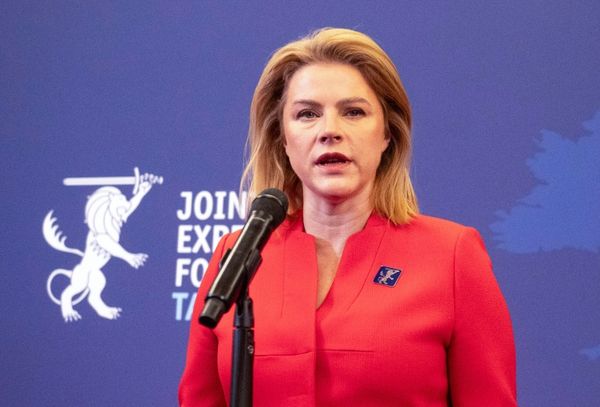
Edward L. “Buzz” Palmer co-founded Chicago’s Afro-American Patrolmen’s League in 1968 and became a community activist who tried to connect people around the world who saw the Black struggle in America as an impetus for change.
Mr. Palmer, a former cop who headed Chicago’s Sister Cities program during Mayor Harold Washington’s administration, died Sunday of prostate cancer at his South Shore home. He was 84.
/cdn.vox-cdn.com/uploads/chorus_asset/file/22444121/0_3.jpg)
His wife, former State Sen. Alice Palmer, said she has gotten condolences from people around the world, including Meghnad Desai, a former British Labour Party politician, Senegalese leader Doudou Diène, Glyn Ford, a former member of the European Parliament, and Finnish scholar Kaarle Nordernstreng.
“His plans and his ideas were good,” she said. “Before you knew it, he had gotten the right people and did it.”
With his wife, Mr. Palmer co-founded the Black Press Institute and also helped start an international news digest, the Black Press Review. He helped organize gatherings for Black journalists to meet newsmakers including United Nations Secretary-General Kofi Annan.
/cdn.vox-cdn.com/uploads/chorus_asset/file/22444125/0_9.jpg)
Relatives said Mr. Palmer helped revive the Black United Fund, a not-for-profit organization, and headed COMPRAND, a community health agency that worked to boost Black enrollment in medical schools. He also arranged international internships for Chicago undergraduates.
/cdn.vox-cdn.com/uploads/chorus_asset/file/22444128/0_4.jpg)
He and his wife hosted one of the first fundraisers for Washington’s mayoral run “at our kitchen table,” according to his stepson David Robinson.
Mr. Palmer was born in Englewood. His father, also named Edward L. Palmer, worked for the post office. He got his nickname at 4 or 5 years old from the buzzing noises he made to mimic airplanes.
After Lindblom High School, he served in the Air Force, where he learned to speak German and his duties included monitoring radio communications in East Germany and behind the Iron Curtain, relatives said.
He was working in the Deering police district when he helped found the Afro-American Patrolmen’s League in 1968 after the Rev. Martin Luther King Jr.’s assassination led to widespread unrest.
Mayor Richard J. Daley — who later said he was misunderstood — issued an order to shoot to kill arsonists, a declaration praised by the Fraternal Order of Police union.
The league questioned Daley’s order and broke with the FOP.
“Law enforcement in the ghetto is being made almost impossible by stop-and-frisk laws and other policies that aggravate tension between residents and police,” Mr. Palmer said.
He knew it was risky to take on City Hall and discrimination in the Chicago Police Department, according to an oral history he gave to The HistoryMakers website, for which he recalled how he felt when he announced the founding of the patrolmen’s league: “I’ve seen some old footage of that, and my voice was quivering because I was scared. Bluntly, I was scared. I was going up against the most powerful mayor in the United States.”
Mr. Palmer and the other founders were handed punitive assignments, said Frank Lee, an early AAPL member who became a bodyguard for Washington.
Sun-Times columnist Mike Royko broke a story about Mr. Palmer’s co-founder Renault Robinson being “assigned to guard an empty alley behind police headquarters.”
“They were very brave and bold because, at that time, there was nobody really supporting them within the police department or the mayor’s office,” said Carol L. Adams, former head of African American studies at Loyola University Chicago and former secretary of the Illinois Department of Human Services. Mr. Palmer, she said, “was not afraid to challenge the status quo.”
That same year, an investigative team produced the Walker Report, which concluded the violence at Chicago’s 1968 Democratic national convention amounted to a “police riot.” In an interview with Jet magazine, Mr. Palmer said, “I just wish the same kind of in-depth study would be made to show how that same kind of brutality is inflicted every day in the Black community.”
The stories of the founding members of the AAPL helped inspire what’s been dubbed TV’s first soul soap opera, “Bird of the Iron Feather,” according to Mark Durham, son of show creator Richard Durham, as well as Beryl Satter, a Rutgers University historian, and Sonja D. Williams, a media professor at Howard University. Premiering on WTTW in 1970, it featured storylines about poverty, predatory credit practices, street gangs and pressures Black officers faced navigating a white-dominated department amid growing calls for Black liberation.
Mr. Palmer had a raucous laugh that people would recognize him by when he and his wife ate breakfast at a favorite haunt, Chef Sara’s Cafe in South Shore.
A memorial is planned April 25 at the South Shore Cultural Center. Mr. Palmer also is survived by his daughters Lisa Russell and Zella Palmer, sisters Ruth Long and Caroline Hudson and seven grandchildren.
Contributing: Lee Bey
/cdn.vox-cdn.com/uploads/chorus_asset/file/22446614/Screen_Shot_2021_04_15_at_1.37.10_PM.png)







